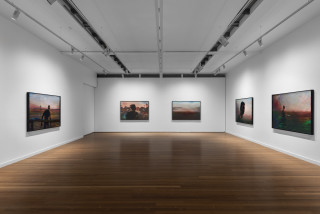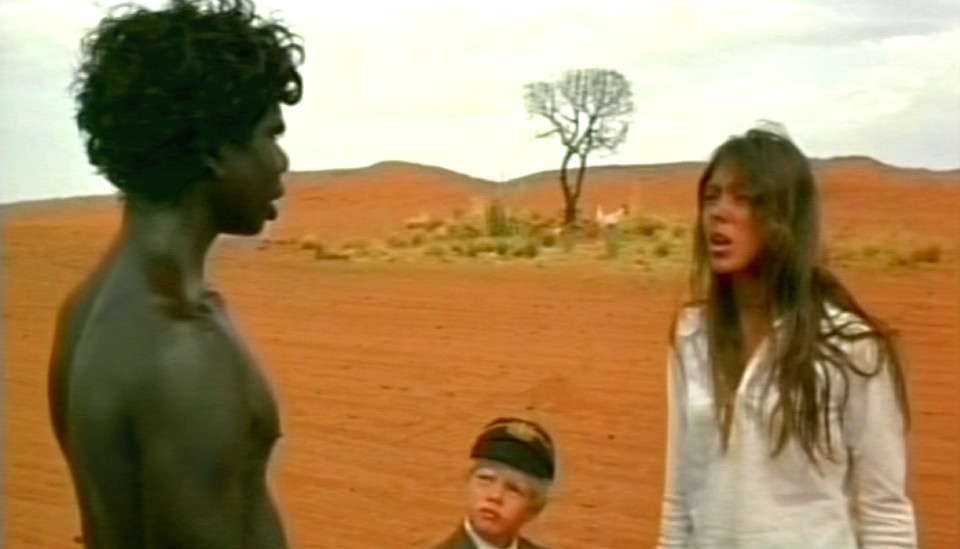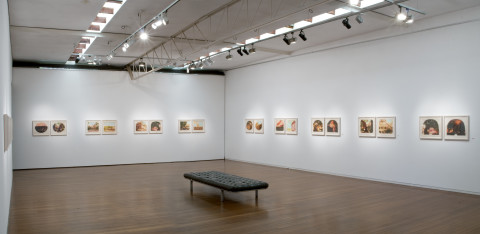In 1997, over a period of a week, I traveled to a mysterious location and shot these pictures. I don’t want to disclose my location shoot because I don’t want the work to be ‘located’ as in a documentary shoot. The photos are not a ‘document’ of a ‘place’.
—Tracey Moffatt
Exhibition Dates: 9 April – 1 May 2010
1. I shot these photographs 13 years ago in 1997. It was only recently in 2006 that I found the black-and-white negatives by chance in my storeroom in Sydney. I wasn’t looking for them; they just appeared. I had completely forgotten that I had shot this work. At the time, I had put these twenty rolls of negatives and contact sheets away because I didn’t like them. I was ashamed of the images and their simplicity, directness and obvious narrative.
In 1997, over a period of a week, I traveled to a mysterious location and shot these pictures. I don’t want to disclose my location shoot because I don’t want the work to be ‘located’ as in a documentary shoot. The photos are not a ‘document’ of a ‘place’. I want the photos to have a dream like feel and look like they could have been shot in Australia’s tropical north, or the Caribbean, or the Deep South in the US, or somewhere in South East Asia. Or possibly Africa. (Doris Lessing’s, The Grass is Singing (1950), is one of my favourite novels and film adaptations…Actress Karen Black gawking at the African man as he showers is seared into my brain.)
THE COLONY
2. At the time, in 1997, the word ‘Colony’ was in my head. I shot this work after I made my photo series Up in the Sky (1997, tinted lithographs) and just before I shot my Laudanum (1998, photogravure) photo series, which incidentally I almost titled ‘Colony’. My Laudanum series is again a photo narrative developed around a location, in this case a rich elegant 1843 colonial house. That was how I liked working then—finding a location and spinning a story around it. Visual colour and pop style was not in my head but vintage photographs were.
I still adore vintage photography; I stare at books with vintage photographs of street scenes, landscapes, and studio portraiture and pornography. I go to markets/fairs and flick through boxes filled with old postcards. I have found the double image for the Plantation photo series from the Stereoscope—a device invented in mid-19th century:
UNEARTHED IMAGES
Narrative and ‘look’ of the Plantation diptych prints
3. Narrative-wise there is something going on in my Plantation diptych photos but I hope firstly it is the unique ‘look’ to the prints that attract. The prints aspire not to be flat, as is the convention of most photography. Instead they have a painted textured surface with heightened colouration. The ‘palette’ can read as pretty and picturesque almost Hallmark greeting card-like in feel. There is a battered, quality to the printing; the images struggle to be images. They are cracked, and parts of the image are not there. The pictures feel like they have been unearthed, as if found in some rotten suitcase buried underneath a collapsed colonial house. The tropical bungalow house on stilts was created for the ‘colonies’. As a child I hid underneath the bungalow in the dirt playing hide and seek. I also buried lollies there that I’d stolen. I was never afraid underneath in the dank dark soil since above me was the sound of adults moving across the floorboards and chatting away about mundane ‘safe’ subjects.
THE ALIEN & the possible UFO
4. If the Plantation photos were indeed found in an old suitcase, then the scenario unfolding in them would read as a little strange. There is a nice slightly run-down colonial house, with lights appearing around it and on the grounds. The lights seem to come from a ‘source’, but they are also coming from the intense sun reflecting off of an iron shed, and a blinding afternoon glare, the type of summer afternoon light that hits you in the eye when you are driving home and it momentarily blinds you. When this happens it is easy to think that you have ‘seen something’ – like an apparition – like a possible UFO in the sky beyond. In the Plantation diptychs, there is a man strolling around, lingering around. I think he is a ‘grounds man’ yet he is also ‘alien’. He is a ‘visitor’—another title for my series could have been The Visitation.
There is also a sugar cane plantation going up in smoke. When I see my ‘alien’ male figure brooding outside the colonial house I think of Max Cady, Robert De Niro’s character in Martin Scorsese’s movie Cape Fear (1991). Although Max Cady wasn’t in my head when I shot this work. Cape Fear was set in the wetlands of Florida, wasn’t it? Somewhere in America’s Deep South—I remember the southern accents and swamps and the everglades. The Max Cady character is a tattooed criminal; he is an alien, an outsider who is not welcomed into the Southern Colonial mansion-style house owned by the terrorized white lawyer and his family.
Yet my ‘man figure’ is also possibly Oliver Mellors, the working class gamekeeper in D.H. Lawrence’s novel, Lady Chatterly’s Lover (1928).
Southern Gothic literature and fiction from American writers such as Tennessee Williams, and Carson McCullers have also been an influence; most of those stories deal with the ‘outsider’ coming ‘in’.
LIKE LITERATURE – LIKE A REPETITIOUS CHANT
5. The ‘dripping southern novel’…This is why my Plantation images drip. I think my Plantation photographs look like literature. The twelve diptychs are like twelve chapters – and they are repetitious storylines – chanting over and over.
THE PROCESS
6. Each Plantation print has a slightly different look since they have been individually printed and touched up with water colour paint, ripped pieces of paper patched on with archival glue. The cracking on the surface is deliberate and is a result of the white ‘Ink Aid’ (this is what it is called) paint dried and then moved through a roller to take the archival ink pigment from the digital Epson printer. (I had to purchase an older model digital Epson printer that was robust and was able to take the thickness of the white ink on the paper. The fancier more expensive, newer models would not work and the ‘heads of the printer’, like the needle on a record player, would get ‘clogged’.) The images are intentionally meant to look like they are falling apart. On some of the prints it looks as though the paint has cracked off – but it didn’t crack off - I took it off. I picked off the paint and patched up the back of the print with paper. The colour pigment is safe and archival and will stay fixed to the paper. The artworks may look delicate but they are not. Like all photography and prints it is best to keep them displayed out of direct sunlight.

digital print with archival pigments, InkAid, watercolour paint and archival glue on handmade Chautara Lokta paper
46 x 50.5 cm (each)
Edition of 12 + AP 2

digital print with archival pigments, InkAid, watercolour paint and archival glue on handmade Chautara Lokta paper
46 x 50.5 cm (each)
Edition of 12 + AP 2

digital print with archival pigments, InkAid, watercolour paint and archival glue on handmade Chautara Lokta paper
46 x 50.5 cm (each)
Edition of 12 + AP 2

digital print with archival pigments, InkAid, watercolour paint and archival glue on handmade Chautara Lokta paper
46 x 50.5 cm (each)
Edition of 12 + AP 2

digital print with archival pigments, InkAid, watercolour paint and archival glue on handmade Chautara Lokta paper
46 x 50.5 cm (each)
Edition of 12 + AP 2

digital print with archival pigments, InkAid, watercolour paint and archival glue on handmade Chautara Lokta paper
46 x 50.5 cm (each)
Edition of 12 + AP 2

Digital print with archival pigments, InkAid, watercolour paint and archival glue on handmade Chautara Lokta paper
54 x 57.5 cm; Paper size: 46 x 50.5 cm (each) - Diptych
Edition of 12 + AP 2

digital print with archival pigments, InkAid, watercolour paint and archival glue on handmade Chautara Lokta paper
46 x 50.5 cm (each)
Edition of 12 + AP 2

digital print with archival pigments, InkAid, watercolour paint and archival glue on handmade Chautara Lokta paper
46 x 50.5 cm (each)
Edition of 12 + AP 2

digital print with archival pigments, InkAid, watercolour paint and archival glue on handmade Chautara Lokta paper
46 x 50.5 cm (each)
Edition of 12 + AP 2

digital print with archival pigments, InkAid, watercolour paint and archival glue on handmade Chautara Lokta paper
46 x 50.5 cm (each)
Edition of 12 + AP 2

digital print with archival pigments, InkAid, watercolour paint and archival glue on handmade Chautara Lokta paper
46 x 50.5 cm (each)
Edition of 12 + AP 2
 Tracey Moffatt The Burning
Tracey Moffatt The Burning
Roslyn Oxley9 Gallery, 2024
 Ten Thousand Suns
Ten Thousand Suns
24th Biennale of Sydney, 2024
 Group Show, The First 40 Years
Group Show, The First 40 Years
Roslyn Oxley9 Gallery, 2024
 Group Show, nightshifts
Group Show, nightshifts
Buxton Contemporary, 2023
 Thinking Historically in the Present
Thinking Historically in the Present
Sharjah Biennial 15, 2023
Free/State
Adelaide Biennial of Australian Art, 2022
 Tracey Moffatt A Haunting
Tracey Moffatt A Haunting
Castlereagh Highway, Armatree, New South Wales, 2021-24
 Tracey Moffatt Portals
Tracey Moffatt Portals
Roslyn Oxley9 Gallery, 2019
 Tracey Moffatt My Horizon
Tracey Moffatt My Horizon
57th Venice Biennale, 2017
 Tracey Moffatt Kaleidoscope
Tracey Moffatt Kaleidoscope
Perth Institute of Contemporary Art, Perth, 2015
 Tracey Moffatt Spirit Landscapes
Tracey Moffatt Spirit Landscapes
Roslyn Oxley9 Gallery, 2013
 Group Show, Head On Photography Festival
Group Show, Head On Photography Festival
Roslyn Oxley9 Gallery, 2011
 Tracey Moffatt Plantation and Other
Tracey Moffatt Plantation and Other
Roslyn Oxley9 Gallery, 2010
 Tracey Moffatt Mother
Tracey Moffatt Mother
Roslyn Oxley9 Gallery, 2009
 Tracey Moffatt First Jobs Series
Tracey Moffatt First Jobs Series
Roslyn Oxley9 Gallery, 2008
 Tracey Moffatt Portraits and DOOMED
Tracey Moffatt Portraits and DOOMED
Roslyn Oxley9 Gallery, 2007
 Tracey Moffatt Under the Sign of Scorpio
Tracey Moffatt Under the Sign of Scorpio
Roslyn Oxley9 Gallery, 2005
 Tracey Moffatt Adventure Series
Tracey Moffatt Adventure Series
Roslyn Oxley9 Gallery, 2004
 Group Show, Dirty Dozen
Group Show, Dirty Dozen
Roslyn Oxley9 Gallery, 2002
 Group Show, The First 20 Years
Group Show, The First 20 Years
Roslyn Oxley9 Gallery, 2002
 Tracey Moffatt Fourth
Tracey Moffatt Fourth
Roslyn Oxley9 Gallery, 2001
 Group Show, All Stars
Group Show, All Stars
Roslyn Oxley9 Gallery, 2000
 Tracey Moffatt Invocations
Tracey Moffatt Invocations
Roslyn Oxley9 Gallery, 2000
 Tracey Moffatt Scarred For Life II
Tracey Moffatt Scarred For Life II
Roslyn Oxley9 Gallery, 2000
 Tracey Moffatt Laudanum
Tracey Moffatt Laudanum
Roslyn Oxley9 Gallery, 1999
 Tracey Moffatt Backyard Series
Tracey Moffatt Backyard Series
Online Gallery, 1998
 Tracey Moffatt Up In The Sky
Tracey Moffatt Up In The Sky
Roslyn Oxley9 Gallery, 1998
 Group Show
Group Show
Roslyn Oxley9 Gallery, 1997
 Tracey Moffatt GUAPA (Goodlooking)
Tracey Moffatt GUAPA (Goodlooking)
Online Gallery, 1995
 Tracey Moffatt Beauties
Tracey Moffatt Beauties
Online Gallery, 1994
 Tracey Moffatt Scarred For Life
Tracey Moffatt Scarred For Life
Online Gallery, 1994
 Tracey Moffatt Pet Thang
Tracey Moffatt Pet Thang
Online Gallery, 1991
 Tracey Moffatt Something More
Tracey Moffatt Something More
Online Gallery, 1989







